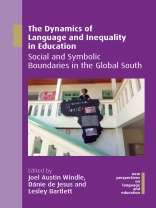This book contributes new perspectives from the Global South on the ways in which linguistic and discursive boundaries shape inequalities in educational contexts, ranging from Amazonian missions to Mongolian universities. Through critical ethnographic and sociolinguistic analysis, the chapters explore how such boundaries contribute to the geopolitics of colonialism, capitalism and myriad, interwoven, forms of social life that structure both oppression and resistance. Boundaries are examined across time and space as relational constructs that mark the terms upon which admission to groups, institutions, territories, or practices are granted. The studies further present alternative educational approaches that demonstrate the potential for agency and transgression, highlighting moments of boundary crossing that disrupt existing linguistic ideologies, language policies and curriculum structures.
Table of Content
Joel Windle, Danie de Jesus and Lesley Bartlett: Introduction: The Dynamics of Language and Inequality in Global Schooling
Section 1: The Shifting Boundaries of Linguistic Inequality
Chapter 1. Dennys Silva-Reis and Marcos Bagno: Across Linguistic Boundaries: Language as a Dimension of Power in the Colonization of the Brazilian Amazon
Chapter 2. Joel Windle and Kassandra Muniz: Navigating Soft and Hard Boundaries: Race and Educational Inequality at the Borderlands
Chapter 3. Daariimaa Marav: Rural-Urban Divides and Digital Literacy in Mongolian Higher Education
Section 2: Language, Ideology and Inequality
Chapter 4. Teresa Speciale: A Cycle of Shame: How Shaming Perpetuates Language Inequalities in Dakar, Senegal
Chapter 5. Indika Liyanage and Suresh Canagarajah: The Role of Shame in Drawing Social Boundaries for Empowerment: ELT in Kiribati
Chapter 6. Junia C. S. Mattos Zaidan: “Authenticity” and Symbolic Violence in Constructions of Teacher Competence
Chapter 7. Maria do Socorro Alencar Nunes Macedo, Daniele Alves Ribeiro, Euclides de Freitas Couto, and André Luan Nunes Macedo: Knowledge Politics, Language, and Inequality in Educational Publishing
Section 3: Transgression and Agency
Chapter 8. Carolyn Mc Kinney: Decoloniality and language in education: Transgressing Language Boundaries in South Africa
Chapter 9. Dánie de Jesus: Queering Literacy in Brazilian Higher Education: Questioning the Boundaries of the Normalized Body
Chapter 10. Osman Z. Barnawi and Phan Le-Ha: “Saudi Women Are Finally Allowed to Sit behind the Wheel”: Initial Responses from TESOL Classrooms
About the author
Lesley Bartlett is a Professor in Educational Policy Studies. She is also affiliated with Anthropology, Curriculum and Instruction, and Latin American, Caribbean, and Iberian Studies (LACIS). An anthropologist by training who works in the field of International and Comparative Education, Professor Bartlett does research in literacy studies (including multilingual literacies), migration, and educator professional development. In 2019, Professor Bartlett was named Faculty Director of the Institute for Regional and International Studies at University of Wisconsin-Madison. She currently co-edits the Anthropology and Education Quarterly with her colleague, Professor Stacey Lee.












